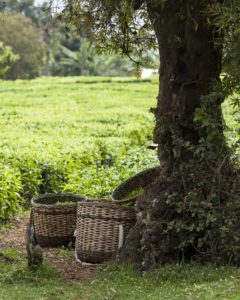 Kenya has displaced India in recent years as a favored trading partner with Pakistan, one of the world’s largest tea consuming countries. In 2017 Pakistan purchased $495 million of mainly black tea, about 40 percent of Kenya’s export earnings from tea.
That expanding relationship was put to the test in January when Pakistan adopted more stringent testing for aflatoxins, a toxic group of metabolites from Aspergillus flavus (the main fungi responsible for its production).
The fungi can be found in tea prepared for export but rarely at levels dangerous to humans.
Kenya has displaced India in recent years as a favored trading partner with Pakistan, one of the world’s largest tea consuming countries. In 2017 Pakistan purchased $495 million of mainly black tea, about 40 percent of Kenya’s export earnings from tea.
That expanding relationship was put to the test in January when Pakistan adopted more stringent testing for aflatoxins, a toxic group of metabolites from Aspergillus flavus (the main fungi responsible for its production).
The fungi can be found in tea prepared for export but rarely at levels dangerous to humans.  According to the International Food Policy Research Institute (IFPRI) aflatoxins, commonly found in rice, maize, cereal grains, and tree nuts, contaminate one-quarter of the global food supply and over half the world's population; 4.5 billion people are exposed to high, unmonitored levels, primarily in developing countries.
The Daily Nation, in Kenya, reported that in January the Plant Protection Board of Pakistan “issued a directive that all tea imports from Kenya must undergo aflatoxin tests, a move that Nairobi protested saying the fungus was not a common occurrence in tea.”
As a result, buyers became reluctant to purchase Kenya tea and consignments were delayed for testing. Tea exports plummeted on the news, dropping from 24 million kilos in 2017 to 12 million kilos. Sales fell to $36.5 million from $73 million in January 2017.
Kenya challenged test results that indicated levels were well below national maximum permissible limits but higher than those allowed in the European Union, the US, and Japan. In February the Pakistan Tea Association successfully convinced the government to reverse costly mandatory testing and reporting requirements.
The reversal comes even though scientists have developed new sensors that detect aflatoxins on location, a simple method to perform that can detect contamination in less than 15 minutes, according to Food Business Africa.
Source: The Economic Times, The Nation, Food Business Africa
According to the International Food Policy Research Institute (IFPRI) aflatoxins, commonly found in rice, maize, cereal grains, and tree nuts, contaminate one-quarter of the global food supply and over half the world's population; 4.5 billion people are exposed to high, unmonitored levels, primarily in developing countries.
The Daily Nation, in Kenya, reported that in January the Plant Protection Board of Pakistan “issued a directive that all tea imports from Kenya must undergo aflatoxin tests, a move that Nairobi protested saying the fungus was not a common occurrence in tea.”
As a result, buyers became reluctant to purchase Kenya tea and consignments were delayed for testing. Tea exports plummeted on the news, dropping from 24 million kilos in 2017 to 12 million kilos. Sales fell to $36.5 million from $73 million in January 2017.
Kenya challenged test results that indicated levels were well below national maximum permissible limits but higher than those allowed in the European Union, the US, and Japan. In February the Pakistan Tea Association successfully convinced the government to reverse costly mandatory testing and reporting requirements.
The reversal comes even though scientists have developed new sensors that detect aflatoxins on location, a simple method to perform that can detect contamination in less than 15 minutes, according to Food Business Africa.
Source: The Economic Times, The Nation, Food Business Africa
